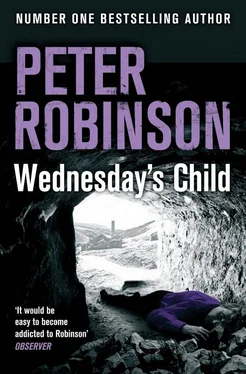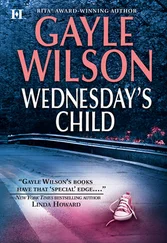Peter Robinson - Wednesday's Child
Здесь есть возможность читать онлайн «Peter Robinson - Wednesday's Child» весь текст электронной книги совершенно бесплатно (целиком полную версию без сокращений). В некоторых случаях можно слушать аудио, скачать через торрент в формате fb2 и присутствует краткое содержание. Год выпуска: 2006, ISBN: 2006, Издательство: Penguin Canada, Жанр: Полицейский детектив, на английском языке. Описание произведения, (предисловие) а так же отзывы посетителей доступны на портале библиотеки ЛибКат.
- Название:Wednesday's Child
- Автор:
- Издательство:Penguin Canada
- Жанр:
- Год:2006
- ISBN:978-0-14-305219-7
- Рейтинг книги:5 / 5. Голосов: 1
-
Избранное:Добавить в избранное
- Отзывы:
-
Ваша оценка:
- 100
- 1
- 2
- 3
- 4
- 5
Wednesday's Child: краткое содержание, описание и аннотация
Предлагаем к чтению аннотацию, описание, краткое содержание или предисловие (зависит от того, что написал сам автор книги «Wednesday's Child»). Если вы не нашли необходимую информацию о книге — напишите в комментариях, мы постараемся отыскать её.
Wednesday's Child — читать онлайн бесплатно полную книгу (весь текст) целиком
Ниже представлен текст книги, разбитый по страницам. Система сохранения места последней прочитанной страницы, позволяет с удобством читать онлайн бесплатно книгу «Wednesday's Child», без необходимости каждый раз заново искать на чём Вы остановились. Поставьте закладку, и сможете в любой момент перейти на страницу, на которой закончили чтение.
Интервал:
Закладка:
“In what way?”
“Just… quiet. Oh, she’s bright, very bright. She’s an excellent reader, and I think, given the opportunity, she could be very creative. That’s one of hers on the wall.”
Banks walked over to the crayon sketch Peggy had pointed at. It showed a girl with pigtails standing beside a tree on a carpet of grass under a bright sun. The leaves were individually defined in bright green, and the grass was dotted with yellow flowers — buttercups, perhaps, or dandelions. The girl, a stick-figure, just stood there with her arms stretched out. Banks found something disturbing about it, and he realized that the girl’s round face had no features. He went back to his chair.
“Very good,” he said. “Did you ever get the feeling that there was something bothering her?”
“She always seems… well, preoccupied.” Peggy gave a nervous laugh. “I call her Wednesday’s child. You know, ‘Wednesday’s child is full of woe.’ She seemed woeful. Of course, I tried to talk to her, but she never said much. Mostly she was attentive in class. Once or twice I noticed she was weeping, just quietly, to herself.”
“What did you do?”
“I didn’t want to embarrass her in front of the others. I asked her afterwards what was wrong, but she wouldn’t say. Gemma’s always been a very secretive child. What goes on in that imagination of hers I’ve no idea. Half the time she seems to be in another world.”
“A better one?”
Peggy Graham twisted her ring. “I don’t know. I like to think so.”
“What was your impression?”
“I think she was lonely and she felt unloved.”
Her first use of the past tense in reference to Gemma wasn’t lost on Banks. “Lonely? Didn’t she have any friends?”
“Oh yes. She was quite popular here, even though she was quiet. Don’t get the wrong impression. She liked playing games with the other girls. Sometimes she seemed quite gay — oops, I shouldn’t have said that, should I, now they’ve censored it from all the Noddy books — cheerful, I suppose. It’s just that she was moody. She had these woeful, silent moods when you just couldn’t reach her. Sometimes they’d last for days.”
“And you don’t know why?”
“I can only guess. And you mustn’t tell anyone I said this. I think it was her home life.”
“What about it?”
“I think she was neglected. I don’t mean she wasn’t well fed or clothed, or abused in any way. Though she did look a bit… well, shabby… sometimes. You know, she was wearing the same dress and socks day after day. And sometimes I just felt like picking her up and dumping her in a bath. It wasn’t that she smelled or anything. She was just a bit grubby. I don’t think her parents spent enough time with her, encouraging her, that sort of thing. I think that was the root of her loneliness. It happens a lot, and there isn’t much you can do about it. A supportive home environment is perhaps even more important than school for a child’s development, but we can’t be parents as well as teachers, can we? And we can’t tell parents how to bring up their children.”
“You mentioned abuse,” Banks said. “Did you ever notice any signs of physical abuse?”
“Oh, no. I couldn’t… I mean, if I had I would certainly have reported it. We did have a case here a year or so ago. It was dreadful, just dreadful what some parents can sink to.”
“But you saw no signs with Gemma? No bruises, cuts, anything like that?”
“No. Well, there was one time. About a week or so ago, I think it was. It was quite warm, like now. Gemma was wearing a short-sleeved dress and I noticed a bruise on her upper arm, the left one, I think. Naturally, I asked her about it, but she said she’d got it playing games.”
“Did you believe her?”
“Yes. I had no reason to doubt her word.”
“So you didn’t report it?”
“No. I mean, one wouldn’t want to be alarmist. Not after that business with the Cleveland social workers and everything. Look, maybe I should have done something. Lord knows, if I’m in any way responsible… But if you brought in the authorities every time a child had a bruise there’d be no time for anything else, would there?”
“It’s all right,” Banks said. “Nobody’s blaming you. Everybody’s a bit sensitive about things like that these days. I picked up plenty of bruises when I was a lad, believe me, and my mum and dad wouldn’t have appreciated being accused of abusing me. And I got a good hiding when I deserved it, too.”
Peggy smiled at him over her glasses. “As I said,” she went on, “Gemma’s explanation seemed perfectly reasonable to me. Children can play pretty rough sometimes. They’re a lot more resilient than we give them credit for.”
“Was that the only mark you ever saw on her?”
“Oh, yes. I mean, if it had been a regular occurrence I’d have said something for certain. We do have to keep an eye open for these things.”
“And she never seemed in pain of any kind?”
“Not physical pain, no. She just sometimes seemed withdrawn, lost in her own world. But children often create their own imaginary worlds. They can be very complex beings, Chief Inspector. They’re not all the same. Just because a child is quiet, it doesn’t mean there’s anything wrong with her.”
“I understand. Please believe me, I’m not criticizing. I’m just trying to find out something about her.”
“How could it help?”
“I honestly don’t know.”
“You think she’s dead, don’t you?”
“I wouldn’t say that.”
“She’s been gone nearly two days now. That’s what the papers say. Not in so many words, perhaps, but…”
“She could still be alive.”
“Then she might be better off dead,” Peggy Graham whispered. She felt up the sleeve of her cardigan for a tissue, lifted her glasses and wiped her moist eyes. They looked small and shy without the lenses to magnify them. “I’m sorry. It’s just… we’re all so upset.”
“Did you, or anyone else on staff, notice any strangers hanging around the school recently?”
“No. And I’m sure anything like that would have been reported. We have very strict guidelines to follow.”
“Nobody saw a dark blue car? Are you sure?”
She shook her head. “I’m sure.”
“Did you ever see Gemma talking to any strangers nearby? Male or female?”
“No. She always came and left with her friends, the ones from the same street. She didn’t live far away.”
Banks stood up. “Thank you very much,” he said. “If you do remember anything, here’s my card. Please call.”
Peggy Graham took the card. “Of course. But I don’t see how there could be anything else.”
“Just in case.”
“All right.” She got to her feet. “I’ll walk to the door with you.” As they walked, a host of children came out of one of the class rooms. Some were laughing and scrapping, but many of them seemed subdued. Perhaps they were too young to understand the enormity of what had happened, Banks thought, but they were old enough to sense the mood of tension and fear. One little girl with glossy dark curls and brown spaniel eyes tugged at Banks’s sleeve.
“Are you the policeman?” she asked.
“Yes,” he answered, wondering how on earth she knew.
“Are you looking for Gemma?”
“Yes, I am.”
“Please find her,” the little girl said, clutching his sleeve tighter. “Bring her back. She’s my friend.”
“I’ll do my best,” said Banks. He turned to Peggy Graham. She blushed.
“I’m afraid I told them a policeman was coming,” she said. “Sorry.”
“It’s all right. Look, can I talk to this girl?”
“Elizabeth? Well… I suppose so. Though I don’t know what… Come this way.” And she led both Banks and Elizabeth into the empty classroom.
Читать дальшеИнтервал:
Закладка:
Похожие книги на «Wednesday's Child»
Представляем Вашему вниманию похожие книги на «Wednesday's Child» списком для выбора. Мы отобрали схожую по названию и смыслу литературу в надежде предоставить читателям больше вариантов отыскать новые, интересные, ещё непрочитанные произведения.
Обсуждение, отзывы о книге «Wednesday's Child» и просто собственные мнения читателей. Оставьте ваши комментарии, напишите, что Вы думаете о произведении, его смысле или главных героях. Укажите что конкретно понравилось, а что нет, и почему Вы так считаете.












